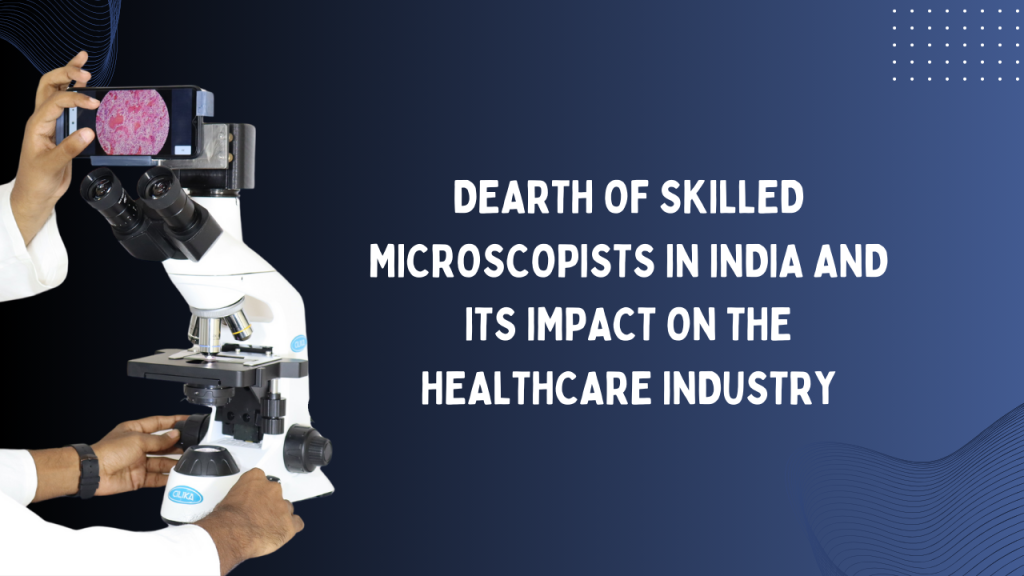In the landscape of medical diagnostics, microscopes play an indispensable role, enabling microscopists to analyse microscopic structures and elucidate the complexities of diseases. However, India finds itself grappling with a significant dearth of skilled microscopists, a predicament that poses a formidable challenge to the nation’s healthcare system.
This deficit of skilled microscopists in India aligns with the broader trend observed across Asia – as per research on global supply of pathologists, conducted by Andrey Bychkov, MD, PhD, Director of Digital Pathology at Kameda Medical Center in Japan and presented at the 2022 annual meeting of United States and Canadian Academy of Pathology (USCAP), covering 134 countries, it came to light that Asia has a severe lack of pathologists with 6.8 pathologists per million population.
The Diagnostic Conundrum
Microscopic analysis is a cornerstone of numerous medical disciplines, including pathology, haematology, and microbiology. From identifying malignant cells to detecting infectious agents, the adept interpretation of microscopic images is crucial for accurate diagnoses and tailored treatment strategies. Unfortunately, the scarcity of trained microscopists in India has far-reaching repercussions.
Diagnostic Delays and Suboptimal Patient Outcomes
When hospitals and diagnostic centres lack sufficient skilled personnel to analyse microscopic samples, the turnaround time between sample collection and diagnosis is prolonged. This delay can prove detrimental, particularly in time-sensitive cases where early intervention is paramount. Furthermore, the absence of experienced microscopists increases the risk of misinterpretation, leading to erroneous diagnoses and potentially compromising patient outcomes.
Impediments to Medical Training
The shortage of skilled microscopists not only impacts patient care but also hinders the training of future medical professionals. Aspiring pathologists, haematologists, and microbiologists rely heavily on hands-on microscopy training to hone their skills. Without a robust network of experienced mentors, the quality of medical education suffers, perpetuating the cycle of scarcity.
Embracing Digital Transformation
In the face of this challenge, the healthcare industry is turning to digital solutions that offer a glimmer of hope. The synergy of digital microscopy and artificial intelligence (AI) has the potential to alleviate the strain on the existing workforce while enhancing diagnostic accuracy.
While digital microscopy and AI cannot entirely supplant the critical role of skilled microscopists, they offer a powerful synergy. By augmenting human expertise with advanced technology, the healthcare industry can navigate the workforce shortage more effectively, ensuring timely and accurate diagnoses for patients nationwide.
Medprime Technologies can significantly contribute to addressing the dearth of skilled microscopists in India through our innovative smart microscopes. The CILIKA digital microscopes, for instance, offer advanced features such as ergonomic design, automated focus, and online data saving and sharing. These features enhance the user experience, reducing the physical strain associated with prolonged use of traditional microscopes and improving the overall efficiency of microscopic analysis. Additionally, the digital microscopes can be integrated with AI-based algorithms for automated analysis, further reducing the workload on pathologists and increasing the accuracy of diagnoses.
As India continues to grapple with the shortage of microscopists, a paradigm shift towards digital transformation and the integration of AI holds the key to fortifying the nation’s diagnostic capabilities. By embracing these cutting-edge solutions, the healthcare sector can mitigate the impact of the skilled workforce shortage and pave the way for a future where microscopic analysis remains a cornerstone of exceptional patient care.
